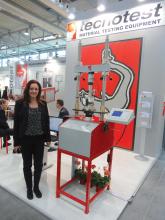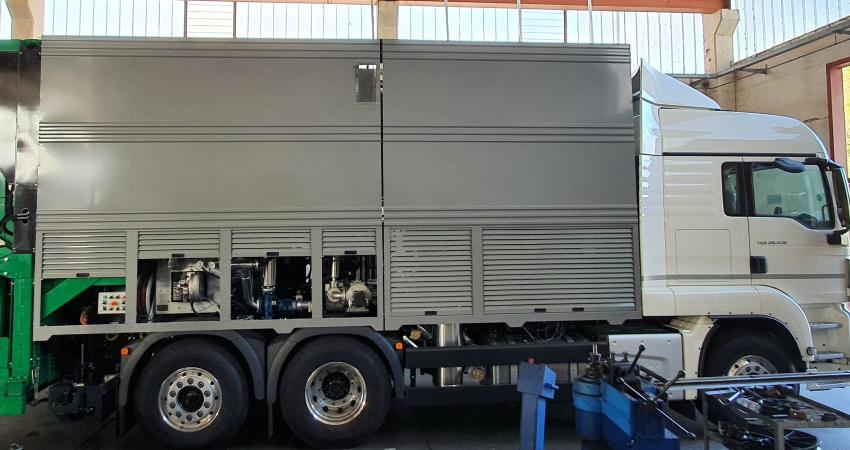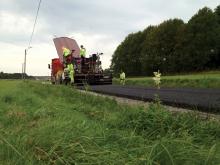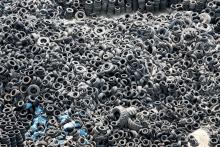At a diminished Asphaltica exhibition, many of Italy’s asphalt sector companies spoke of the importance of overseas markets. Kristina Smith spoke to some of the firms seeking export success. Italy’s 6th Asphaltica show, held in Padua in November last year, provided a snapshot of the challenging economic conditions faced by the country. 2012 was the year when Italy felt the impact of the economic crisis which many other European countries had already suffered. Reflecting this, the exhibition was half the siz
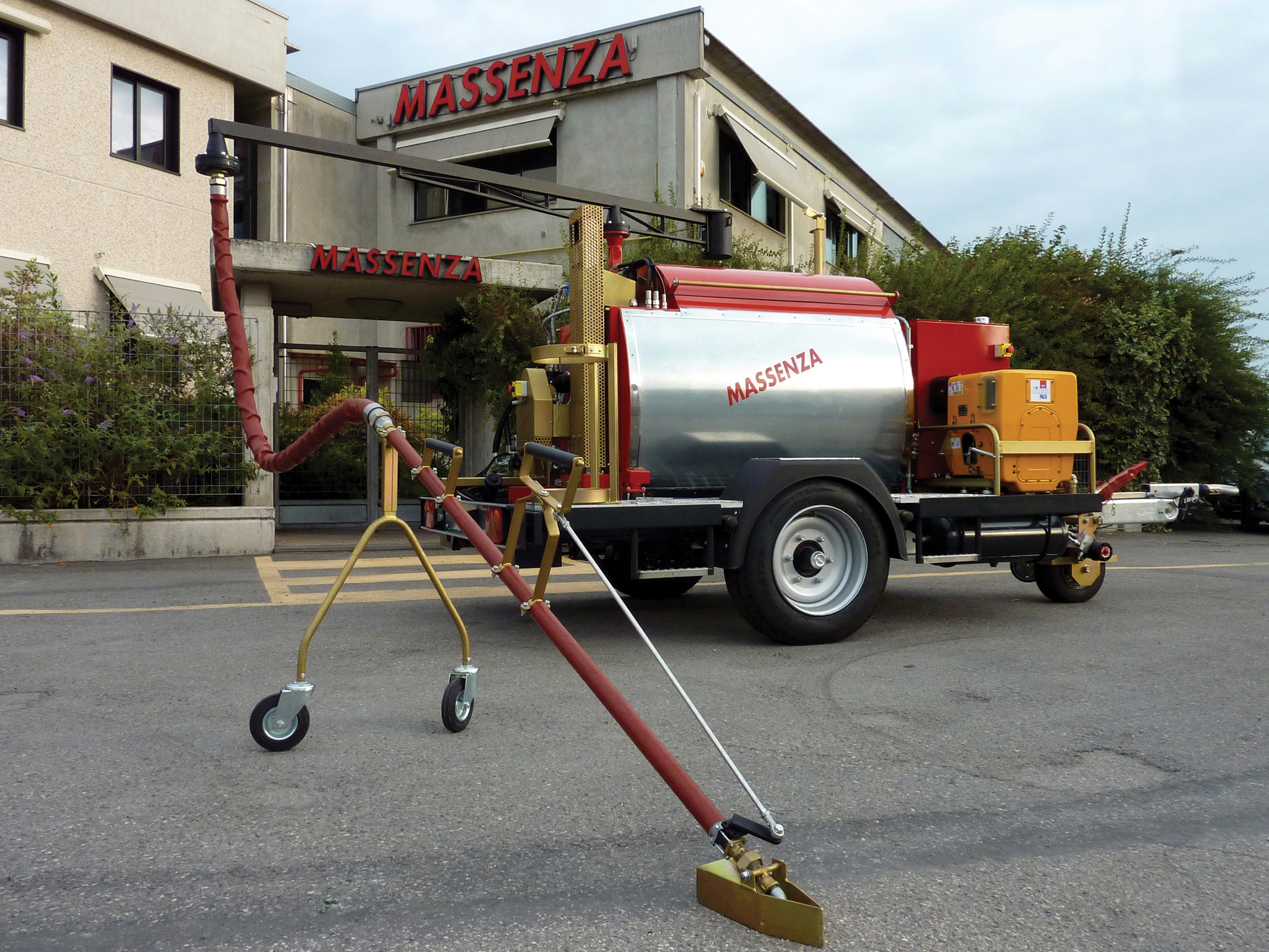
The new Sealmass units from Massenza is aimed at use in repairing roads and airport pavements
At a diminished Asphaltica exhibition, many of Italy’s asphalt sector companies spoke of the importance of overseas markets. Kristina Smith spoke to some of the firms seeking export success
Italy’s 6thOne exhibitor told
The need to reach a more international market was one of the factors behind the decision to hold the next Asphaltica in 2014 in Verona. Italian asphalt and road association
SITEB director Stefano Ravaioli told World Highways, “Now we want to internationalise this exhibition, we need a different exhibition centre.”
One of the very few international exhibitors at the 2012 show was Russian oil giant Gazprom. Russia’s biggest producer of bitumen, Gazprom also has refineries in Serbia and, incentivised by the Russian Government, is looking for export markets for its products.
Specialist manufacturer Index has created a reinforcing layer for maintenance and new build applications which combines the functions of a SAMI (stress absorbing membrane interlayer) and a waterproofing membrane. Dynamic testing in the laboratory has shown that it can last five times longer than normal asphalt before cracking.
Index will be targeting any countries which experience rainfall, says sales and technical manager Danilo Valerio. For existing roads, Autotene can help extend periods between maintenance and can be used in high-wear areas such as bus stops or slow lanes on motorways. Countries which build new roads under concession-type models where the constructor is also responsible for maintenance are also a target.
The increased use of cold recycled mixes in countries such as Italy and UK will also encourage the use of products such as Autotene, said professor Francesco Canestrari of Universita Politecnica delle Marche in Ancona, who has worked with Index to develop the new product. Canestrari chairs an international working group on the use of reinforcement products in pavements
“Cold recycled mixes are very good as a sub base layer because they have very good compressive strengths, however they can crack. And we need to avoid cracks in the upper layer,” said Canestrari.
Swiss authorities have already carried out trials of Autotene. And in Italy, it has been trialled on a section of Autostrada A14.
A SAMI helps dissipate the stress from bottom-up cracks. Autotene acts as a SAMI and, with an added fibreglass grid, is also a waterproofing layer, preventing water being pushed down through cracks by passing vehicles, which in turn leads to the creation of potholes.
Index began developing Autotene two-and-a-half years ago and has to date invested €300,000 according to Valerio, with development work ongoing. The University helped optimise the product, selecting a mesh size of 12.5mm and an elastomeric polymer rather than the cheaper plastomeric polymers usually used in such products, because these specifications gave better results.
“By talking with the big manufacturers, we found out that the hydraulic power their machines could supply was getting bigger, day by day,” said Simex’s assistant general manager Federico Tamburri. “So we decided to give our customers the opportunity to cover a bigger planing area with one pass.”
Simex has manufactured six units to date, which it has supplied to customers in Italy, France and Australia. The manufacturer, which also designs customised attachments for its clients, also supplies its range of equipment to the Middle East, US and Russia.
The PL1200 is based in the same technology as Simex’s 1m-wide PL1000 which benefits from a unique self-levelling ability. This means that when the operator cannot see whether the planer is touching the ground – as is often the case – the patented self-levelling function means that a level, even surface will always be achieved.
Also on display at Asphaltica and aimed at the repair and maintenance sector, was Massenza’s new Combimas plant. Combimas allows the contractor to apply both the aggregate and the emulsion or PMB.
“We developed the prototype three or four years ago,” said Massenza. “At the beginning of next year, we will supply a second machine to the same contractor.”
Radar survey equipment manufacturer IDS is bucking the trend by being one of the few Italian manufacturers to successfully supply its technology to China. The Chinese market accounts for 40% of IDS’s georadar business and the firm works with a local partner in the country.
IDS’s georadar division produces products which use ground penetrating radar to help map out what lies beneath a road’s surface in order to locate utilities or to help diagnose why a road is failing. IDS supplies its kit to both specialist firms and larger companies and local authorities who are responsible for the maintenance of road networks.
Although there are similar Chinese products, IDS’s regional sales and marketing manager for the georadar division Simone Cerella credits the firm’s success in China to the fact that it is also one step ahead, developing new solutions all the time. Its latest development saw it develop a scanner with 40 antennae which can survey a whole lane.
“That took us two years to develop,” said Cerella. “It’s not just the hardware that has to be developed, it’s the software too. It’s not easy to develop a cheap version.”
Asphalt plant manufacturer
Bernardi is also looking to grow its sales of recycling related plant, said Caramelli. “Italy, Poland and the UK are the three main markets,” he said.
In the home market of Italy, asphalt plant manufacturers face the problem of legislation which has set unrealistic levels for emissions. Bernardi has joined forces with Italian asphalt and road association SITEB, fellow manufacturers
“We are trying to get together to establish reasonable values,” said Caramelli. “The authorities are trying to impose levels far, far higher than can be achieved. The client finds himself unable to buy a machine which conforms to emission levels.”
Having launched its Gyratory Compactor and sold seven units in Italy,
“There is a market outside Europe,” said Sarson. “From the enquiries I am receiving, other countries are asking for accessories for handling emulsified asphalt.” She cites Saudi Arabia, Qatar, United Arab Emirates, Kuwait, Brazil and South Africa as well as developed countries including Korea, Malaysia, Thailand and Australia.
“There are many producers of Gyratory Compactors in the US and Europe,” said R&D engineer Pierpaolo Viola. “Maybe we were last to the market but that means that we know the market and the target, which has allowed us to combine the competitive aspects with the technical aspects.”

